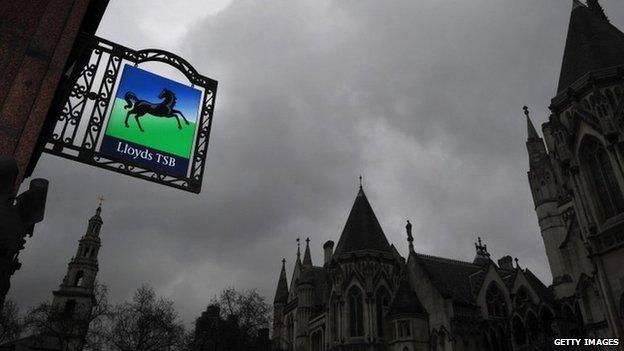Scottish independence: Lloyds and Barclays say referendum a 'potential risk'
- Published

Lloyds bank group highlighted Scottish independence in a list of "risks"
Lloyds Banking Group and Barclays have both cited the Scottish independence referendum as a potential risk to their businesses.
In their annual reports, the banks listed the referendum alongside a raft of other perceived risks from the UK, Europe and across the world.
Finance Secretary John Swinney said the comments highlighted why a currency union was the "right proposal".
The UK Treasury said the reports showed the "risks and costs" of independence.
In its annual report, external, Lloyds - which is Britain's biggest bank - said it had concerns over potential compliance costs and funding in the event of a "yes" vote in the referendum, which will be held on 18 September.
Under the heading Risk Management, which also included six other potential risks, the report stated: "The impact of a yes vote in favour of Scottish independence is uncertain.
"The outcome could have a material impact on compliance costs, the tax position and cost of funding for the group."
The banking group said the picture was "uncertain" and that it would continue to monitor the potential impact of independence.
Higher on Lloyds list of risks was the potential interventions by competition authorities, including the new UK Competition and Markets Authority, in the event of "perceived or actual market inefficiencies" as banks return to profit.
The widening remit of the recently established UK Financial Conduct Authority was another key risk, as was the developing legislation to ring-fence banks' retail and investment arms and UK and European requirements on the amount of capital banks should hold.
A spokesman for Lloyds said: "Lloyds Banking Group believes that questions about Scotland's future constitutional position are a matter for the people of Scotland and the UK and Scottish Parliaments.
"There are no immediate issues that will affect Lloyds Banking Group customers either in Scotland or the rest of the UK, particularly as any change in constitutional arrangements are unlikely to come into effect until 2016."
Separately, Barclays said in its own annual report, external, which was also published on Wednesday, that the referenda on Scottish independence and on UK membership of the European Union, expected before 2017, may affect the group's risk profile.
'Registered offices'
This would be through "introducing potentially significant new uncertainties and instability in financial markets, both ahead of the respective dates for these referenda and, depending on the outcomes, after the event", it said.
The Risk Review section of its report also highlighted concerns in the market about credit risk, including that of sovereign states, and the Eurozone crisis.
The exit of one or more countries from the Eurozone was also cited as a risk, as was decline in residential prices in the UK, western Europe and South Africa.
Meanwhile, the BBC's Robert Peston said he had learned that if the people of Scotland voted yes to independence on 18 September then both Royal Bank of Scotland and Lloyds "may be forced to move their registered offices or legal homes to London under European Union law".
He blogged that a senior banker had told him that legal advice had been sought on the impact of the EU directive, Council Directive 95/26/EC of 29 June 1995, because it "has never been tested in the courts and there is no case law around it".
Reacting to the reports, Mr Swinney commented that Scotland had a strong and diverse economy and the point of independence "was to win the powers we need to build on those strengths and create a more prosperous and secure economy".
He believed that would be good for the financial sector and "everyone else".
Mr Swinney added: "Lloyds Banking Group's comments show exactly why our proposals for a formal currency area are the right proposals, why they are in the best interests of business on both sides of the border and why that is what will be implemented by both governments.
"The real uncertainty for financial services businesses - as Barclays have correctly identified - is the proposed in-out referendum on EU membership, which risks taking Scotland out of Europe with all the consequences for jobs, investment and prosperity that would entail."
However a Treasury spokesman said the bank reports were in tune with last months's announcement by the Scottish financial institution, Standard Life.
Standard Life said it might move some of its operations outside Scotland in the event of independence.
The Treasury spokesman said: "Lloyds have now joined RBS and Standard Life in reasonably and fairly pointing out the risks and costs that arise from independence.
"This uncertainty is being made worse by the Scottish government's failure to set out a plan for what currency it would use in the event of independence.
"These interventions from business show that the strength and stability of the United Kingdom is the essential underpinning of Scotland's successful financial services sector over several centuries. It's common sense to stick with something that works."